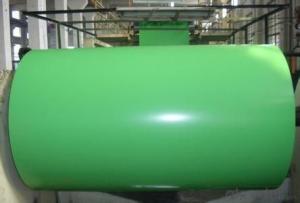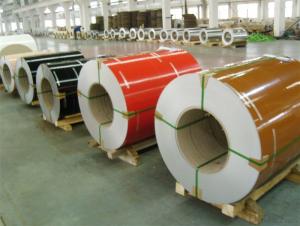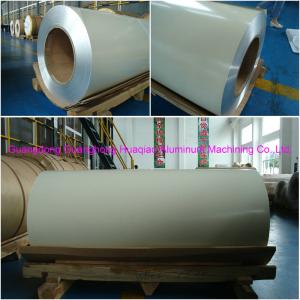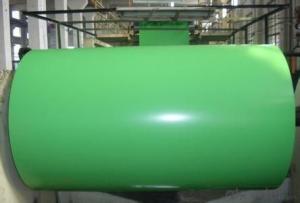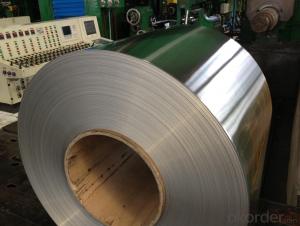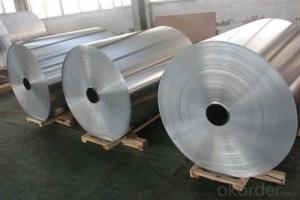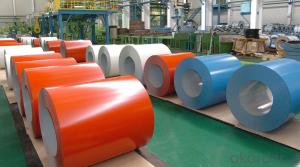Aluminum Coil for Channel Letter - Pre-Painted PE Hot Sales Coil/Sheet
- Loading Port:
- Shanghai
- Payment Terms:
- TT OR LC
- Min Order Qty:
- 8 m.t.
- Supply Capability:
- 2000 m.t./month
OKorder Service Pledge
OKorder Financial Service
You Might Also Like
Specification
Structure of Aluminium Pre-painted PE Hot Sales Coil/Sheet Description:
Coated aluminum coil/sheet are of a wide range of colors, which gives wonderful appearance no matter in residential and commercial constructions of great exhibition centers.
The coated aluminum coil/sheet have been widely used in the fields of construction and decoration( garage doors, ceiling etc.), electronic appliances, lighting decoration, air-condition air pipes, sandwich panels and drainages etc.
Main Features of theAluminium Pre-painted PE Hot Sales Coil/Sheet:
1) High flexibility
2) Impact resistance
3) Excellent weather-proof durability
4) Anti-ultraviolet
5) High erosion resist
Images of the Aluminium Pre-painted PE Hot Sales Coil/Sheet:
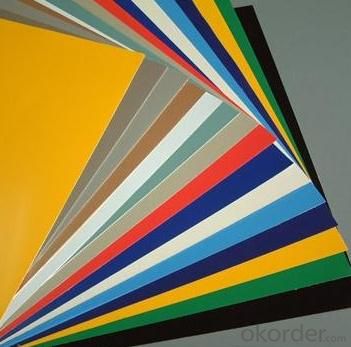
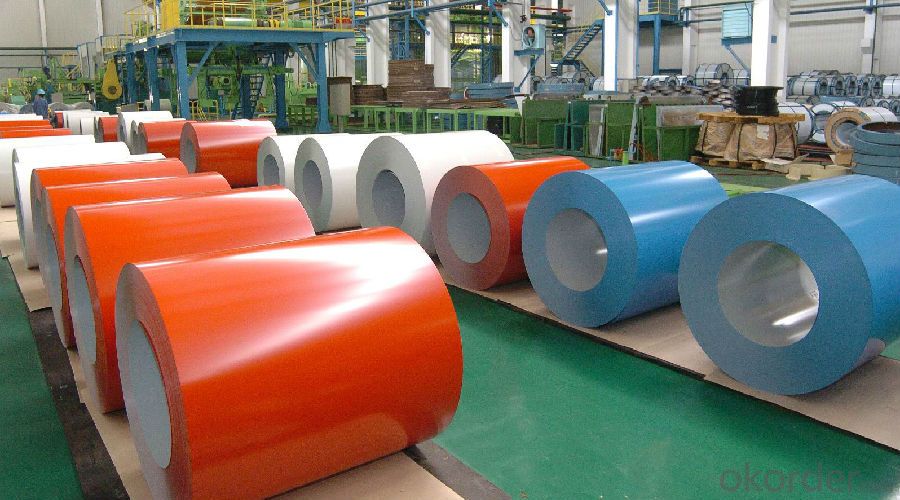
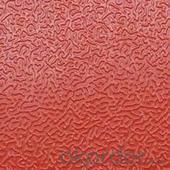
Aluminium Pre-painted PE Hot Sales Coil/Sheet Specification:
Alloy | A1100,A3003,A1050,A8011 etc |
Temper | H16,H18,H24 |
Thickness | From 0.024mm to 1.2mm |
Width | Standard width:1240mm |
Special width:1300mm,1520mm,1570mm,1595mm | |
Diameter | Standard dia:1200mm |
Interior dia:150mm,405mm,505mm | |
Weight | 2.5 T/coil,3.0 T/coil |
Coating | PE, PVDF, AC |
Surface | Embossed, mill finish, coated |
Color | AS to code RAL |
Gloss | 10-90%(EN ISO-2813:1994) |
Coating Thickness | PE: more than 18 micron |
PVDF: more than 25 micron | |
Coating Hardness (pencil resistance) | More than 2h |
Coating adhesion | 5J(EN ISO-2409:1994) |
Impact Resistance | No peeling or cracking(50 kg/cm,ASTMD-2794:1993) |
Flexibility (T-bend) | 2T |
MEK resistance | More than 100 |
FAQ Aluminium Pre-painted PE Hot Sales Coil/Sheet:
a.What is monthly capacity
---CNBM is one stated own company and our monthly capacity is about 2000tons.
b. Now which countries do you export your goods?
---Now we export to South East Asia,Africa, North America,South America ect.
- Q: What is the creep resistance of aluminum coils?
- The creep resistance of aluminum coils is generally high, as aluminum has a low melting point and exhibits minimal creep deformation under normal operating conditions.
- Q: Are aluminum coils suitable for architectural facades?
- Yes, aluminum coils are suitable for architectural facades. Aluminum is a popular choice for architectural facades due to its numerous advantages. Firstly, aluminum is lightweight, which makes it easier to handle and install compared to other materials. This is especially beneficial for high-rise buildings or complex architectural designs. Secondly, aluminum is highly durable and corrosion-resistant. It is naturally resistant to rust and does not require any additional coatings or treatments. This makes aluminum coils suitable for long-term use in various weather conditions, including harsh climates or coastal areas where corrosion is a concern. Furthermore, aluminum coils offer versatility in terms of design and customization. They can be easily formed into different shapes, sizes, and profiles, allowing architects and designers to create unique facades that meet their specific requirements. Aluminum can also be painted or coated in different colors and finishes to achieve the desired aesthetic appeal. In addition to its functional and aesthetic advantages, aluminum is also an environmentally friendly choice. It is a recyclable material, meaning that it can be reused indefinitely without losing its properties. This makes aluminum coils a sustainable option for architectural facades, aligning with the growing focus on green building practices. Overall, aluminum coils are a suitable choice for architectural facades due to their lightweight nature, durability, versatility, and sustainability. They offer a wide range of design possibilities while ensuring long-term performance and low maintenance requirements.
- Q: Is anodized aluminum suitable for indefinite salt-water exposure or will it rust? Also note that it would be used for the hull of a boat (more like a platform), and if it is not suitable could you suggest another metal?
- Aluminum would be an ideal material stainless steel a better one, aluminum does not rust it deteriorates to electrolite when in contact with salt water and a magnetic or ferrus metal. Therefore as long as your boat is fitted with salt water anodes it should create no problems if not it will deteriorate rapidly in salt water. All powered salt water craft/vessels carry anodes ie there is an anode fitted to the aluminum drive leg of an outboard or Z drive if intended for salt water use, On larger ships the anodes are normally fixed to the rudder blade so equip your platform the same. Zink anodes are cheap and available at every salt water chandlers. You should also use non ferrus bolts and screws to screw your construction together with, or to fix it to the hull, or better make a set of jigs to suit shape size and then get it TIG welded never mix ferrus and non ferrus metals in the presence of salt water without a zink anode, the damage is rapid and attacks the structure of the non ferrus metal creating an electric field and destroying the weakest current catalyst ie the aluminum itself. The non ferrus metals that in general maritime use that are are not so much effected by salt water are phosphor bronze, brass,and copper.Non of these would be suitable for making your platform, therefore aluminum. If weight is not a problem though i would recommend a middle grade stainless steel such as se 80 or around that grade, And again it would be better to be TIG welded than bolted together, bolts are subject to movement (especially at sea) and therefore hole enlargement. As are safety standard pop rivets.
- Q: What is the difference between pre-painted and natural aluminum coils?
- Pre-painted and natural aluminum coils refer to two different types of aluminum coils used in various industries. The main difference between pre-painted and natural aluminum coils lies in their surface finish. Pre-painted aluminum coils, as the name suggests, are coated with a layer of paint or a protective coating before they are delivered to the customers. This coating is applied in a controlled environment, ensuring a uniform and durable finish. The pre-painted coating provides several advantages such as enhanced corrosion resistance, improved aesthetics, and better weatherability. It also allows for a wide range of color options, making it suitable for architectural applications where color matching is important. On the other hand, natural aluminum coils are left untreated and retain their original metallic appearance. These coils are typically used in applications where the natural aluminum finish is desirable, such as in the manufacturing of consumer electronics, automotive parts, and other industrial products. Natural aluminum coils are known for their excellent thermal conductivity, lightweight nature, and high strength-to-weight ratio. In summary, the difference between pre-painted and natural aluminum coils lies in their surface finish. Pre-painted aluminum coils are coated with a protective layer of paint, offering enhanced corrosion resistance, improved aesthetics, and color options. Natural aluminum coils, on the other hand, retain their original metallic appearance and are often used in applications where the natural aluminum finish is preferred.
- Q: How do aluminum coils compare to fiberglass coils in terms of weight?
- Compared to fiberglass coils, aluminum coils are generally lighter in weight. Aluminum is renowned for its lightweight properties, making it an excellent choice for various applications, including coil manufacturing. On the contrary, fiberglass tends to be denser and heavier than aluminum. This disparity in weight offers several advantages when it comes to installation and transportation. The lighter aluminum coils are easier to handle, necessitate less effort for installation, and can be more cost-effective for shipping and logistics. Moreover, the reduced weight of aluminum coils contributes to overall energy efficiency in HVAC systems, as it requires less power to circulate air through the coils. Nevertheless, it is important to note that the weight comparison between aluminum and fiberglass coils may vary based on the specific design and thickness of the materials utilized.
- Q: Can aluminum coils be recycled multiple times without losing their properties?
- Yes, aluminum coils can be recycled multiple times without losing their properties. Aluminum is a highly recyclable material and can be melted down and reused indefinitely without any significant degradation in its properties. This makes aluminum coils a sustainable and environmentally friendly choice for various applications.
- Q: What are the different color options for anodized aluminum coils?
- The different color options for anodized aluminum coils include silver, gold, bronze, black, blue, red, green, and various shades of gray.
- Q: Are aluminum coils suitable for heat sinks?
- Indeed, aluminum coils are well-suited for heat sinks. The reason for aluminum's popularity in this regard lies in its exceptional thermal conductivity and affordability. Its remarkable thermal conductivity permits efficient heat transfer from a heat source to the heat sink's fins, which effectively dissipate the heat into the surrounding environment. Moreover, aluminum possesses the advantageous qualities of being lightweight and easily moldable into different shapes, thereby rendering it a versatile material for heat sink purposes. All in all, aluminum coils prove to be a fitting option for heat sinks due to their ability to effectively dissipate heat and their cost-effectiveness.
- Q: Is it possible to utilize a grinder to smooth out or remove a damaged area on a steel coil?
- <p>Yes, you can use a grinder to grind down a damaged section of a steel coil. However, it's crucial to use the appropriate type of grinder designed for metalworking and to ensure safety precautions are taken, such as wearing protective gear. The grinder should be capable of handling the hardness of the steel and should be operated by someone experienced with such equipment. Always follow the manufacturer's guidelines and safety standards to prevent accidents and ensure the effectiveness of the grinding process.</p>
- Q: Can aluminum coils be formed into different shapes?
- Aluminum coils possess the capability to assume diverse configurations. Such metal, known for its high malleability, exhibits an ability to undergo bending, shaping, and forming without fracturing. This particular attribute deems it an optimal material for myriad applications necessitating flexibility and adaptability. Aluminum coils, employing a myriad of techniques like bending, rolling, stamping, extrusion, or even specialized machinery like a coil forming machine, can be fashioned into an array of shapes. These shapes encompass sheets, plates, tubes, wires, or intricate three-dimensional structures. The capacity to mold aluminum coils into assorted forms renders it an exceptional choice for sectors such as construction, automotive, aerospace, and manufacturing, where customized parts and components are frequently required.
Send your message to us
Aluminum Coil for Channel Letter - Pre-Painted PE Hot Sales Coil/Sheet
- Loading Port:
- Shanghai
- Payment Terms:
- TT OR LC
- Min Order Qty:
- 8 m.t.
- Supply Capability:
- 2000 m.t./month
OKorder Service Pledge
OKorder Financial Service
Similar products
Hot products
Hot Searches
Related keywords
